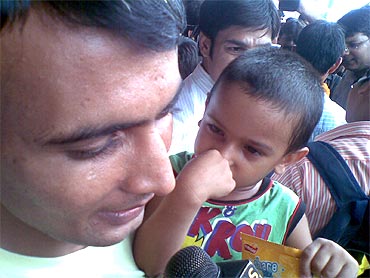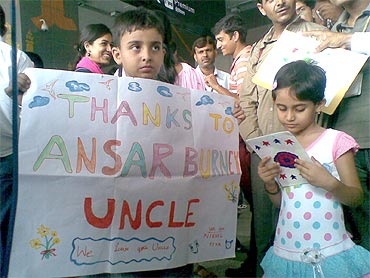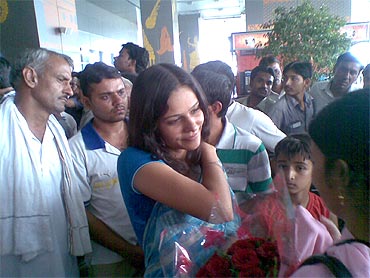
The Indian government practically did nothing to attempt a rescue of their sailors kept in captive by Somali pirates for over 10 months. The Pakistani people and its government ran the whole show of getting them to safety and gave a wonderful welcome to the freed sailors.
The 22-member crew of Egyptian merchant vessel MV Suez, which included 11 Egyptians, four Pakistanis, six Indians and one Sri Lankan, was taken captive after Somalian pirates attacked them last year. The sailors were freed after Pakistan human rights activist Ansar Burney raised money for their ransom after successfully negotiating their release.
The anger against the Indian administration was evident. The 10-year-old son of one of the rescued Indian sailors displayed a sketch with the words, "Thank you Ansar Burney uncle," addressing Pakistani human rights activist, whose NGO Ansar Burney Welfare Trust, collected donations from Pakistani people to pay the ransom money demanded by the Somali pirates.
The little boy, Nikhil Sharma is the son of third engineer N K Sharma. He told rediff.com, "I really want to thank Burney uncle. It was only through his efforts that my father came back today. I have seen my mother run to everyone in our government, but most of the times they just gave us promises and then never attended our calls."
His little sister Jiya, 5, chips in, "I have spoken to Burney uncle. He sounded like a very nice man. I am so happy that my father is here finally."
Nikhil and Jiya, accompanied by their mother, Madhu Sharma, had reached the Terminal 3 of the Indira Gandhi International Airport by 8.15 am -- more than an hour before Sharma's expected arrival. They were to wait for two and a half hours more before Sharma would finally come out of the airport.
"He has been waiting for so long. What is an hour or two for us? I will happily wait for him. I have hardly slept the whole night," Madhu says.
Sampa Arya, wife of another sailor, Ravinder Singh, however, does not conceal her "severe disappointment" with the Indian government.
"I had lost all hope. I had knocked on every door possible, including the highest door --that of the prime minister. When he said there was nothing he could do, I thought it was all over. What kind of government tells you that the lives of the sailors on board of a hijacked vessel is the responsibility of the ship owner? You know, we call Pakistani people terrorists and level a string of allegations against them. In the time of our most severe need, they were the one who got the job done, and they rescued not only Pakistani sailors, but also Indians, that too after our government neglected us," says Sampa.
When asked about this, N K Sharma says, "When that navy officer cut the call, my mind went completely numb. I thought all was lost. I never dared to hope to come back alive. It was only because of the Pakistani navy that we are here."
MV Suez, laden with a cargo of cement, was sailing toward Eritrea when it was hijacked on August 2, 2010 by over 50 Somali pirates in the Gulf of Aden. For about 10 months, the 22-member crew were tortured, kept hungry and ill-treated. Even negotiations began months later, as it was difficult to establish a contact with them.
Satnam Singh says, "We were tortured and beaten up. They would give us very little food and even lesser water. All we had for 10 months was plain rice and occasionally some curry. Most of the time, we were ordered to be in a kneeling position."
Sharma says, "For food, all we got was left-overs. Many of us fell sick. They refused to even give us medicines. The healthy ones among us put wet clothes on the foreheads of the sick ones."
What was even scarier for the crew was that two days after they were released, another group of Somalian pirates attacked them.
"It was later in the evening that another group almost captured us. We managed to escape somehow. The Indian Navy had told us that they were monitoring and tracking our movement and that they would respond within minutes if another attack took place. But they never came," Satnam Singh says.